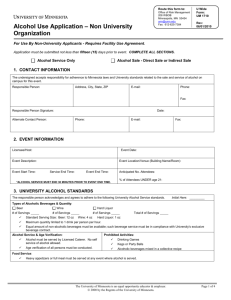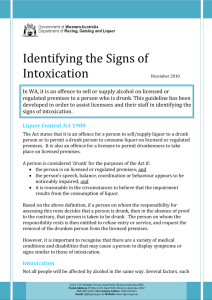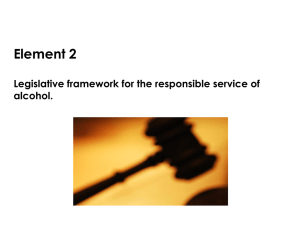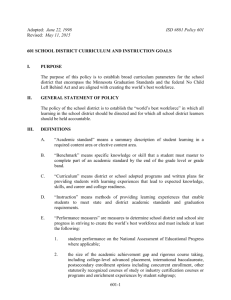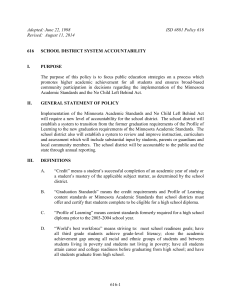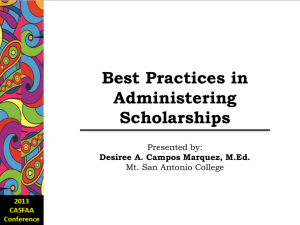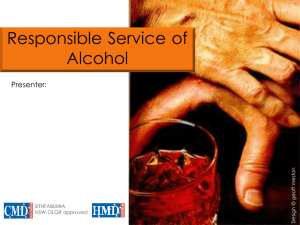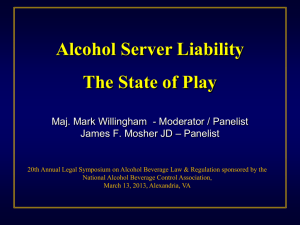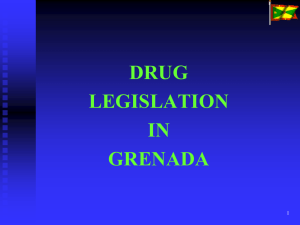Social Host Liability
advertisement
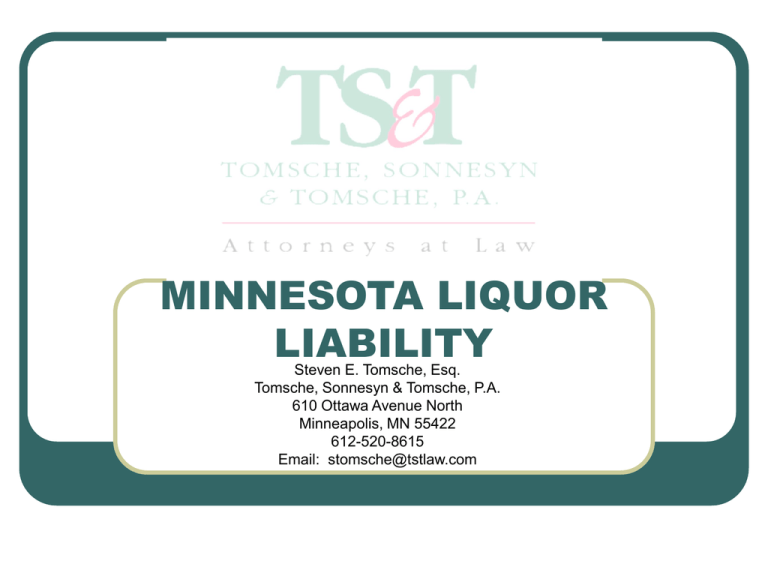
MINNESOTA LIQUOR LIABILITY Steven E. Tomsche, Esq. Tomsche, Sonnesyn & Tomsche, P.A. 610 Ottawa Avenue North Minneapolis, MN 55422 612-520-8615 Email: stomsche@tstlaw.com THE MINNESOTA DRAM SHOP ACT The Minnesota Dram Shop Act, also known as the Minnesota Civil Damages Act, provides as follows: Subdivision 1. Right of action. A spouse, child, parent, guardian, employer or other person injured in person, property or means of support, or who incurs other pecuniary loss by an intoxicated person or by the intoxication of another person, has a right of action in the person’s own name for all damages sustained against a person who caused the intoxication of that person by illegally selling alcoholic beverages. All damages recovered by a minor under this section must be either, paid to the minor or to the minor’s parent, guardian, or next friend as the court directs. Minn. Stat. § 340A.801. Five elements must be satisfied to establish liability against a Minnesota liquor vendor: 1. An illegal sale of intoxicating liquor; 2. The illegal sale caused or contributed to the allegedly intoxicated person’s (AIP) intoxication; 3. The AIP’s intoxication was a direct cause of the plaintiff’s injury; 4. The plaintiff sustained damages recoverable under the Civil Damage Act (CDA); and 5. Proper notice must be provided to the liquor vendor pursuant to Minn. Stat. § 340A.802. Was there a sale or barter of an alcoholic beverages? A sale or barter must involve a bargained-for exchange for liability to exist under the CDA. Did cash change hands? Drinks “on the house”? - for goodwill? future business? Sale to an obviously intoxicated person It is illegal to sell alcoholic beverages to any individual who is obviously intoxicated. Minn. Stat. § 340A.502. It has been stated that a sale is illegal when the seller, using his usual and reasonable powers of observation, sees or should see that the buyer is intoxicated. A person is not obviously intoxicated within the meaning of the dram shop statute simply by virtue of having reached a certain blood alcohol content level. There is a distinct difference between the term under the influence of intoxicating liquor as used in Minnesota’s traffic statute and the term obviously intoxicated as used in the context of a dram shop lawsuit. nickname Sale to a minor or underage drinker (under 21) A sale to a minor, defined as a person under the age of 21, is expressly prohibited under Minnesota law. A Minnesota liquor vendor can successfully defend against the allegation that it served an underage drinker by establishing by a preponderance of the evidence that it relied in good faith upon some form of false ID. Other Types of Illegal Sales • Sale to a non-member of a club • Sale after hours • Sale on a prohibited day • On-sale of alcoholic beverage which is consumed off premises • Sale of alcohol at an establishment not properly licensed to serve alcohol Did the illegal sale(s) cause both the intoxication and the accident/injury? (1) Did the illegal sale contribute to the intoxication? (2) Was the intoxication a direct/proximate cause of the plaintiff’s injuries or damages? Was the intoxication only the “occasion” of the plaintiff’s injury or damages? Who Can Sue? • Spouse • Child • Parent • Guardian • Employer • Other person – e.g. fiancé * Exception: An intoxicated person is prohibited from suing a liquor vendor for his/her own injuries resulting from his/her voluntary intoxication. Who Can Be Sued? Only the liquor licensee holder can be sued. • A commercial (“for profit”) liquor vendor Social hosts cannot be sued under the CDA. • However, social hosts CAN be sued for serving minors under Minnesota’s social host liability laws. Damages • Bodily Injury • Loss of means of support – “reduction in standard of living” – economic loss • Pecuniary loss – “loss of companionship, guidance, advice, comfort and protection” • Property damage – “medical bills, damage to motor vehicle, etc.” Damages Punitive damages are not allowed. There is no cap on damages in a liquor liability lawsuit. Municipal Liability in Dram Shop A municipal liquor store or bar can be sued under the CDA. Minn. Stat. § 466.04, subd. 1 limits a municipality’s liability as follows: Maximum liability. Subdivision 1. Limits … (a) Liability of any municipality on any claims within the scope of sections 466.01 to 466.15 shall not exceed … (3) $1,000,000 for any number of claims arising out of a single occurrence, for claims arising on or after January 1, 2000… Comparative Fault General Rule – Comparative negligence/fault of a plaintiff serves to reduce or bar the plaintiff’s claim in a liquor claim. • Negligence – failure to use reasonable care • Complicity – buying drinks for the AIP * Exception – Comparative negligence/fault of the intoxicated person is not imputed to an innocent spouse or children. Notice Requirements • Notice for injury/death claims must be given within 240 days of the date of entering the attorney-client relationship. • Contribution claims – Notice must be served within 120 days after the injury occurs or within 60 days after receiving written notice of a claim for contribution, whichever is applicable. Caveat for Auto Insurers Section 340A.802, subd. 2 provides, in part: “[in] the case of claims for contribution or indemnity, the notice must be served within 120 days after the injury occurs or within 60 days after receiving written notice of the claim for contribution or indemnity, which ever is applicable.” Consequences of Giving Bad Faith Notice • Liability for actual damages • Reasonable out-of-pocket attorney fees Statute of Limitations All claims/lawsuits must be brought within 2 years of accident. • Tolling does not apply to a lawsuit brought pursuant to the CDA. Joint and Several Liability Minnesota law provides that a liquor vendor is liable, jointly and severally, with other tortfeasors. In the 2003 legislative session, the Minnesota Legislature approved an amendment to Minn. Stat. § 604.02, subd. 1 that substantially altered Minnesota law with respect to joint and several liability. The new law provides: When two or more persons are severally liable, contributions to awards shall be in proportion to the percentage of fault attributable to each, except that the following persons are jointly and severally liable for the whole award: 1. a person whose fault is greater than 50%... Joint and Several Liability The impact of this change in dram shop cases is enormous because the intoxicated person who caused the accident typically has both the greatest degree of fault and least ability to pay a judgment. Juries typically place about 20% fault on the liquor establishment when an illegal sale is found and about 80% to the intoxicated driver. Investigation The legislature recognizes that early investigation is crucial in a dram shop claim. That is why there is a notice requirement of 240 days commencing on the date of the attorney/client relationship • It is wise to retain a professional investigator to conduct the investigation. • The investigator should attempt to interrogate the AIP as soon as possible. • The investigation should focus on the location of the drinking, the amount of alcoholic beverages consumed, signs of intoxication, potential witnesses, and how the motor vehicle accident occurred. Social Host Liability In Minnesota, social host liability stems from the illegal act of providing alcohol to an individual under 21 years old. There are two causes of action against a social host in Minnesota: • Minn. Stat. § 340A.801, subd. 6 • Minn. Stat. § 340A.90 Minn. Stat. § 340A.801, subd. 6 Common law claims. Nothing in this chapter precludes common law tort claims against any person 21 years or older who knowingly provides or furnishes alcoholic beverages to a person under the age of 21 years. Minn. Stat. § 340A.90 Subdivision 1. Right of action. (a) A spouse, child parent, guardian, employer, or other person injured in person, property, or means of support, or who incurs other pecuniary loss, by an intoxicated person under 2 years of age or by the intoxication of another person under 21 years of age, has for all damages sustained a right of action in the person’s own name against a person who is 21 years or older who: (1) had control over the premises and, being in a reasonable position to prevent the consumption of alcoholic beverages by that person, knowingly or recklessly permitted that consumption and the consumption caused the intoxication of that person. . .
